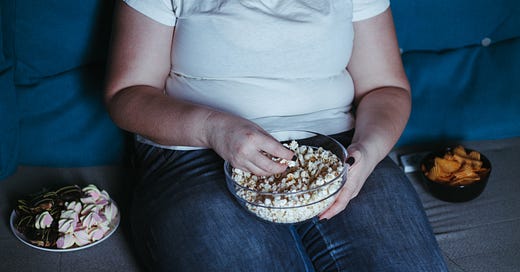Why Did I Eat That?
Understanding Overeating, Binge Eating & Emotional Eating from a Faith-Based Perspective
Food is meant to nourish us, connect us, and even bring joy. But for many of us, eating becomes tangled up with chemicals, emotions, habits, shame, and past hurt. If you’ve ever asked yourself after a binge, “Why did I eat that?”—you’re not alone. When we understand the reasons behind the question ‘why did I eat that?’ we can start to respond with grace & healing instead of guilt and spiral.
In this blog, we’ll break down the differences between overeating, binge eating, and emotional eating, and talk about why they happen and how to find hope and healing—especially if you're walking this journey with Jesus.
🍽️ What Is Overeating?
Overeating is when we eat more food than our body actually needs—or more than we intended to. It’s common, especially in social settings, celebrations, or when we’re distracted.
Common Signs of Overeating:
Feeling overly full or sluggish after meals
Eating past physical satisfaction
Snacking out of boredom or habit
Grazing all day without real hunger
💬 Overeating isn’t always wrong or disordered, but if it becomes a go-to way to manage stress or emotions, it may be time to take a closer look at what’s really going on underneath.
⚠️ What Is Binge Eating?
Binge Eating Disorder (BED) is a diagnosable mental health condition and the most common eating disorder in the U.S. It involves eating large amounts of food in a short time—often in secret—and feeling out of control while doing it.
Signs of Binge Eating Disorder:
Eating large quantities of food, even when not hungry
Eating very quickly or to the point of discomfort
Feeling unable to stop during a binge
Experiencing shame, guilt, or depression afterward
Episodes occur at least once a week for 3+ months (DSM-5 criteria)
💡 Binge eating is not about a lack of willpower. It’s often linked to emotional wounds, trauma, or a cycle of dieting and restriction. If this sounds familiar, please reach out for help—you’re worth it.
😔 What Is Emotional Eating?
Emotional eating is when we use food to cope with our feelings—instead of dealing with the emotions directly. It’s not a clinical diagnosis, but it’s very real and very common.
Triggers for Emotional Eating:
Stress, anxiety, or overwhelm
Loneliness or boredom
Celebrating or rewarding yourself
Guilt, shame, or sadness
Emotional Eating Often Sounds Like:
“I’ve had a hard day. I deserve this.”
“Just give me the chocolate—I don’t care.”
“I’m not hungry, I just need something…”
🙏 The goal is not to stop emotional eating forever, but to learn to care for your heart in other ways—especially when food isn’t really what you need.
📣 So What’s the Difference?
Here’s a quick recap of the three behaviors we’ve talked about:
Overeating
This is when we eat more food than our body needs—often unintentionally. It might happen at social events, when we're distracted, or simply out of habit.
Key signs: Feeling sluggish or overly full, grazing throughout the day, continuing to eat even after feeling satisfied.
Binge Eating
Binge Eating Disorder (BED) involves consuming large amounts of food in a short period of time, often in secret, and feeling out of control while doing it.
Key signs: Eating rapidly, eating past comfort, experiencing deep shame or guilt afterward, and feeling unable to stop.
Emotional Eating
This is when food becomes a way to soothe or manage difficult emotions rather than satisfy physical hunger.
Key signs: Craving food during stress, eating when sad or lonely, turning to food as a reward or comfort, even without physical hunger.
These behaviors can overlap—and healing often starts with understanding the “why” behind the “why did I eat that?”.
❤️ Where to Get Help
If any of this sounds familiar, please hear this: you're not alone, and you can overcome. These patterns are common—and help is available.
📞 Trusted Resources
National Eating Disorders Association (NEDA)
nationaleatingdisorders.org | 1-800-931-2237
Screening tools, support, and helplineBetterHelp (formerly Faithful Counseling)
betterhelp.com
Online therapy with licensed counselors, including Christian-based optionsNew Life Ministries Counseling Network
newlife.com/counselors
Find trusted Christian counselors through the nationwide network created by New Life MinistriesThe Dear Food Podcast
Hosted by Julia Fikse | Available on Spotify + Apple
Faith-based help for food addiction, emotional eating, and lasting food freedomDear Food, I Love You, I Hate You. Don’t Leave Me! Workbook 1
Available on Amazon
A practical, grace-based workbook for overcoming food struggles with biblical truthThe Dear Food Community at Circle
Click Here to join
Join our private community for faith-filled encouragement, prayer, and support on your food freedom journeyYour Local Church or Christian Counselor
Many churches offer support groups, prayer counseling, and pastoral care—often free or low cost
✨ Final Word of Encouragement
Let’s start the road to healing with this:
God cares about what you eat, yes. But more than that, He cares about why you're hurting yourself with food.
If your relationship with food is affecting your heart and your hope—Jesus wants to meet you there. He’s not waiting for you to “clean up eating” to help. He’s inviting you to come close and be restored as He helps you right now.
“Come to me, all who are weary and burdened, and I will give you rest.” —Matthew 11:28
You don’t have to fix it all today. Just take one small, real step toward getting help. Here at Dear Food, we are cheering you on and praying for your journey to freedom.
Written by Julia Fikse, NBC-HWC, FMCHC
National Board-Certified and Functional Medicine Certified Health Coach
Host of The Dear Food Podcast
⚖️ Disclaimer
This blog is for informational purposes only. It is not medical or mental health advice. Please consult a licensed professional if you are struggling with an eating disorder or emotional distress.



